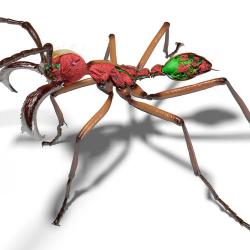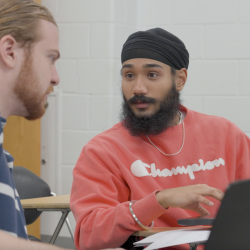From Fighting COVID-19 to Further Understanding T. Rex: Read our Top Stories of 2020
This year has been unlike any other, and our college was no exception. Through it all, our faculty, staff and students accomplished great things. From fighting COVID-19 to winning prestigious scholarships to making new research discoveries, members of the University of Maryland's College of Computer, Mathematical, and Natural Sciences did it all. As 2020 comes to a close, take some time to revisit our most-read stories of the year and discover some that you may have missed.
10. UMD-led Study Named Science’s Most Impactful Paper of 2019 - The American Association for the Advancement of Science (AAAS) awarded its 2019 Newcomb Cleveland Prize to Entomology's Raymond St. Leger and Brian Lovett and their seven West African collaborators for their fearless innovation in developing and testing a genetically engineered fungus to fight mosquito-borne diseases such as malaria, dengue and Zika.
9. DNA May Not Be Life’s Instruction Book—Just a Jumbled List of Ingredients - Cell Biology & Molecular Genetics' Antony Jose developed a potentially revolutionary framework for heredity and evolution in which inheritable information is stored outside the genome.
8. Could Your Vacuum be Listening to You? - Computer Science's Sougata Roy helped demonstrate that popular robotic household vacuum cleaners can be hacked to act as remote microphones.
7. UMD Science Major Wins Prestigious Churchill Scholarship - Senior Tanay Wakhare, a mathematics and computer science double-degree student, was awarded a 2020 Winston Churchill Scholarship, which provided him full funding to pursue a one-year master’s degree at the University of Cambridge in the United Kingdom.
6. U.S. News Ranks UMD’s Computer Science Undergraduate Program Among Nation’s Best - UMD's undergraduate computer science program ranked No. 16 in the nation in the 2021 edition of U.S. News & World Report’s “Best Colleges.” The undergraduate program ranked 8th among public universities.
5. T. rex’s Long Legs Were Made for Marathon Walking - A study by Geology's Thomas Holtz found that leg length gave giant predatory dinosaurs the advantage of efficiency, not speed as previously thought.
4. Four Science Terps Named 2020 Goldwater Scholars - For the third year in a row, UMD's four undergraduate nominees were awarded scholarships by the Barry Goldwater Scholarship and Excellence in Education Foundation, which encourages students to pursue advanced study and research careers in the sciences, engineering and mathematics. The students' majors included biochemistry, biological sciences, computer science, mathematics and physics.
3. Scientists Discover Volcanoes on Venus Are Still Active - A study by Geology's Laurent Montési identified 37 recently active volcanic structures on Venus. The study provides some of the best evidence yet that Venus is still a geologically active planet.
2. UMD Department Chair Fights COVID-19—and Not Just in the Lab - Cell Biology & Molecular Genetics' Jonathan Dinman shares his coronavirus story: “The irony of the virologist being infected with COVID-19 does not escape me, that’s for sure.”
1. Scientists Detect Unexpected Widespread Structures Near Earth’s Core - Geology's Doyeon Kim and Vedran Lekić conducted the first simultaneous analysis of hundreds of earthquakes to identify echoes from features deep inside Earth.








